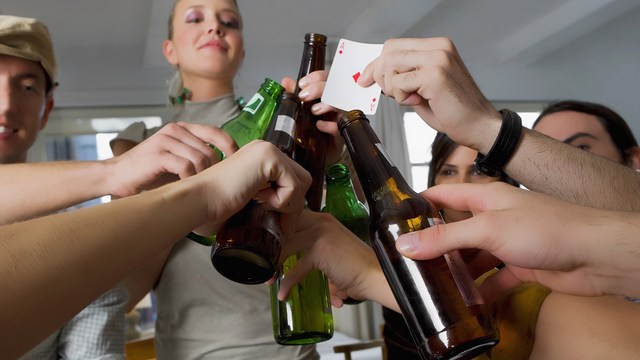 PS Productions/PhotoSpin
PS Productions/PhotoSpin
Looking out at the tremendous snow storm we're experiencing, it's hard to believe that Spring Break is in full force. Thousands of college and high school students are off school now and Spring Break will continue over the next several weeks for many others.
Some people enjoy the end of the skiing season but many head south to the beaches and warm weather for a respite from the harsh winters of the north. And while most students behave responsibly on these annual excursions, others do not, and enter into a potentially lethal cycle of binge drinking.
Forbes has written about Spring Break binge drinking with some frightening statistics on the death rates among students every year.
Nearly 2000 students will die every school year from alcohol-related accidents, mostly to do with alcohol poisoning.
With alcohol poisoning, breathing slows down and a person can pass out. Alcohol affects the gag reflex and choking on vomit becomes a real risk. In fact, too much alcohol can cause the body to stop breathing altogether. Alcohol on its own can poison the body and shut organs down, causing death.
What is binge drinking?
For men, it's five drinks or more within two hours. For women, it's four drinks within two hours since they are smaller than men and absorb the alcohol more quickly.
But the Forbes article shared information given by the National Institute on Alcohol Abuse and Alcoholism (NIAAA) that four or five drinks is not what's really happening. The NIAAA believes it's far worse. Males report having around 18 drinks per day and women estimate about 10 drinks daily.
While nearly 2000 annual deaths is hard to contemplate, there are other consequences of binge drinking that include falls, drunk driving accidents, drownings, physical and sexual assaults.
Here are some terrifying facts from Forbes:
Assault:
More than 690,000 students between the ages of 18 and 24 are assaulted by another student who has been drinking.
Sexual Abuse:
More than 97,000 students between the ages of 18 and 24 are victims of alcohol-related sexual assault or date rape.
Injury:
599,000 students between the ages of 18 and 24 receive unintentional injuries while under the influence of alcohol.
Our culture almost expects heavy drinking among students during Spring Break. Reality shows glorify it. Because of this mindset, the dangers can be overlooked.
But college students still need guidance, especially from their parents. Letting their adult children of legal drinking age know that a few drinks are okay is a good idea but warning them of the dangers that come along with binge-drinking is very important. Moderation is key.
Ultimately, their children will do whatever they want to do but setting a positive foundation for a healthy attitude toward drinking may decrease the odds of binging. This alcohol abuse can lead to addiction.
If anyone suspects it of themselves or loved ones, there are many ways to understand how this happens.
In EmpowHER's article The Science of Addiction you can read about how the effects of alcohol can stimulate addiction. The article also discusses what to look out for if you suspect an addiction.
"You may have a problem with drugs or alcohol, if:
◾ You can't predict whether or not you will use drugs or get drunk.
◾ You believe that you need to drink and/or use drugs in order to have fun.
◾ You turn to alcohol and/or drugs after a confrontation or argument, or to relieve uncomfortable feelings.
◾ You need to drink more or use more drugs to get the same effect as previously.
◾ You drink and/or use drugs by yourself.
◾ You have periods of memory loss.
◾ You have trouble at work, in school, or in your personal relationships because of drinking or using drugs.
◾ You make promises to yourself or others that you'll stop getting drunk or using drugs but are unable to keep them.
◾ You feel alone, scared, miserable, and depressed."
Alcohol is something that most adults use, and use responsibly. But for some, it can get out of hand and cause enormous distress and even death.
Seeking help is a very courageous thing to do so ask your doctor, family or a good friend to help you or a loved one in this process.
Happy Spring Break!
Sources:
Forbes.com. Pharma and Health. "Spring Breaks Greatest Dangers." Web. Retrieved March 11th, 2014.
http://www.forbes.com/sites/robertglatter/2014/03/11/spring-breaks-great...
EmpowHER.com. Addictions. "The Science of Addiction." Web. Retrieved March 11th, 2014.
https://www.empowher.com/media/reference/science-addiction
Reviewed March 13, 2014
by Michele Blacksberg RN
Edited by Jody Smith




Add a CommentComments
There are no comments yet. Be the first one and get the conversation started!